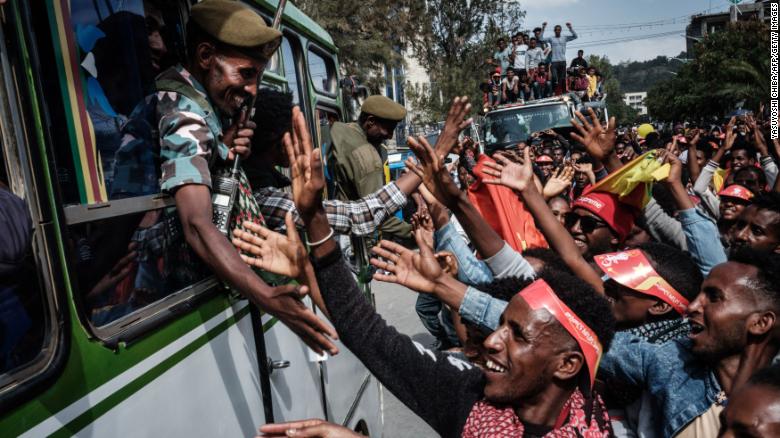Washington calls Ethiopia’s temporary ceasefire in region a ‘promising development’
:quality(70)/cloudfront-eu-central-1.images.arcpublishing.com/thenational/J2PR32BD57KNLCZYNMTXB7236A.jpg?resize=800%2C0&ssl=1)
Millions have been displaced in Tigray due to the fighting and about 350,000 are facing famine. AFP
The US government on Tuesday expressed cautious optimism after the withdrawal of Ethiopian forces from Tigray, but said that with Eritrean troops still in the region, the temporary ceasefire remains fragile.
“This is a promising development and we welcome it,” Robert Godec, acting assistant secretary of state for African affairs told the House Foreign Affairs Committee in the Biden administration’s first comment on the withdrawal.
But he added that “it is essential now that all parties commit to the ceasefire, allow humanitarian access, protect civilians, have independent investigations into atrocities so that there is justice for the victims.”
Last November, Ethiopia’s Prime Minister Abiy Ahmed, backed by Eritrean troops and allied militias, launched a military offensive against the Tigray People’s Liberation Front (TPLF).
Since then, more than two million civilians have been internally displaced and 5.2 million people in the region are in urgent need of food, the UN said.
Mr Abiy, who has been under international pressure to end the fighting, ordered the withdrawal on Monday.
But US officials say Eritrean forces remain in the war-torn region.
“We have seen some indications of movement but we don’t know yet if they are withdrawing,” Mr Godec told members of Congress. “They have committed horrifying atrocities, that much is clear.
“The Eritrean forces need to leave immediately — that is absolutely necessary if there is going to be peace or the restoration of civil order and stability in Tigray and more generally in Ethiopia.”
A UN report released this month detailed grave human rights abuses committed by Eritrean troops in Tigray.
The international body has received information that Eritrean soldiers have carried out “deliberate attacks against civilians and summary executions, indiscriminate attacks, sexual and gender-based violence, arbitrary detention, destruction and looting of civilian property and displacement, and the abduction of Eritrean refugees and asylum seekers.”
Mr Godec described the Eritrean forces’ role as “malign” and made clear that their failure to withdraw could bring more US sanctions on Asmara.
“If the [Ethiopian] government’s announcement does not result in improvements and the situation continues to worsen, Ethiopia and Eritrea should anticipate further action,” he said.
Cameron Hudson, a senior fellow with the Atlantic Council’s Africa Centre, saw Eritrea as an easy target for US sanctions if it does not pull out its troops.
“Eritrea has been accused of some of the worst human rights violations against civilians in this conflict, and given their pariah status, sanctioning them for their actions would not come at a high cost to Washington,” Mr Hudson told The National.
This is in contrast to Ethiopia, which “Washington has held out hope … could return to being a reliable and stable partner in the region.”
Mr Abiy’s forces have recently lost ground to the TPLF, leading the expert to argue that Ethiopia’s withdrawal was more of a “tactical retreat” and a realisation that the tide is turning against it in the conflict.
“These government announcements mask a hard reality that the Tigrayans were turning the tide in the conflict … faced with a ‘leave it or lose it’ choice, Abiy Ahmed left and is now hoping to gain the upper hand by framing his actions as a humanitarian gesture,” Mr Hudson said.
The UN estimates about 350,000 people in Tigray are facing famine, including roughly 30,000 children that are now considered malnourished.







 h
h
 https://i1.wp.com/eritreahub.org/wp-content/uploads/2021/07/Screenshot-2021-07-03-at-08.31.55.png?resize=300%2C109&ssl=1 300w" sizes="(max-width: 462px) 100vw, 462px" data-recalc-dims="1" style="box-sizing: inherit; border: 0px; max-width: 100%; height: auto; float: left; margin-right: 1.5em; margin-bottom: 1em;">The firm has
https://i1.wp.com/eritreahub.org/wp-content/uploads/2021/07/Screenshot-2021-07-03-at-08.31.55.png?resize=300%2C109&ssl=1 300w" sizes="(max-width: 462px) 100vw, 462px" data-recalc-dims="1" style="box-sizing: inherit; border: 0px; max-width: 100%; height: auto; float: left; margin-right: 1.5em; margin-bottom: 1em;">The firm has 


:quality(70)/cloudfront-eu-central-1.images.arcpublishing.com/thenational/J2PR32BD57KNLCZYNMTXB7236A.jpg?resize=800%2C0&ssl=1)


























